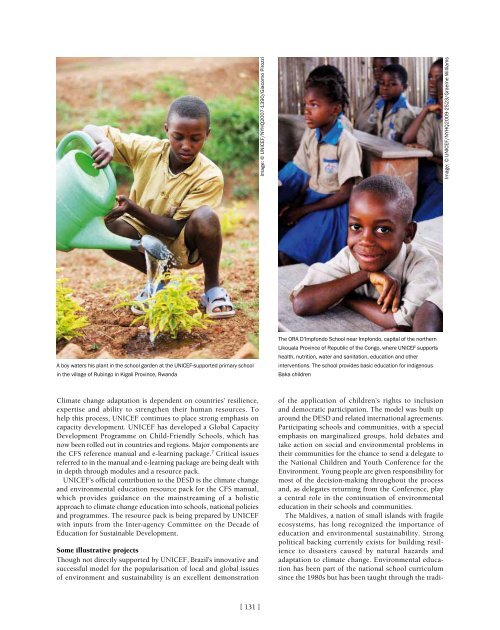Tomorrow today; 2010 - unesdoc - Unesco
Tomorrow today; 2010 - unesdoc - Unesco
Tomorrow today; 2010 - unesdoc - Unesco
Create successful ePaper yourself
Turn your PDF publications into a flip-book with our unique Google optimized e-Paper software.
Image: © UNICEF/NYHQ2007-1390/Giacomo PirozziImage: © UNICEF/NYHQ2009-2523/Graeme WilliamsA boy waters his plant in the school garden at the UNICEF-supported primary schoolin the village of Rubingo in Kigali Province, RwandaThe ORA D’Impfondo School near Impfondo, capital of the northernLikouala Province of Republic of the Congo, where UNICEF supportshealth, nutrition, water and sanitation, education and otherinterventions. The school provides basic education for indigenousBaka childrenClimate change adaptation is dependent on countries’ resilience,expertise and ability to strengthen their human resources. Tohelp this process, UNICEF continues to place strong emphasis oncapacity development. UNICEF has developed a Global CapacityDevelopment Programme on Child-Friendly Schools, which hasnow been rolled out in countries and regions. Major components arethe CFS reference manual and e-learning package. 7 Critical issuesreferred to in the manual and e-learning package are being dealt within depth through modules and a resource pack.UNICEF’s official contribution to the DESD is the climate changeand environmental education resource pack for the CFS manual,which provides guidance on the mainstreaming of a holisticapproach to climate change education into schools, national policiesand programmes. The resource pack is being prepared by UNICEFwith inputs from the Inter-agency Committee on the Decade ofEducation for Sustainable Development.Some illustrative projectsThough not directly supported by UNICEF, Brazil’s innovative andsuccessful model for the popularisation of local and global issuesof environment and sustainability is an excellent demonstrationof the application of children’s rights to inclusionand democratic participation. The model was built uparound the DESD and related international agreements.Participating schools and communities, with a specialemphasis on marginalized groups, hold debates andtake action on social and environmental problems intheir communities for the chance to send a delegate tothe National Children and Youth Conference for theEnvironment. Young people are given responsibility formost of the decision-making throughout the processand, as delegates returning from the Conference, playa central role in the continuation of environmentaleducation in their schools and communities.The Maldives, a nation of small islands with fragileecosystems, has long recognized the importance ofeducation and environmental sustainability. Strongpolitical backing currently exists for building resilienceto disasters caused by natural hazards andadaptation to climate change. Environmental educationhas been part of the national school curriculumsince the 1980s but has been taught through the tradi-[ 131 ]

















